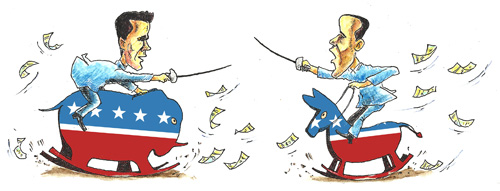|
 |
|
(CFP) |
As the rip-roaring Republican and Democratic national party conventions came to an end, the U.S. presidential race tightened leading into the November election.
Gallup polls conducted after the two parties' conventions showed that incumbent U.S. President Barack Obama received a slightly bigger "bump" in voter support than Republican challenger Mitt Romney, who held a consistent two-point advantage in mid-August. Meanwhile, other major U.S. pollsters also confirmed Obama's recent lead over Romney.
Political analysts say many voters have pinned hopes on Romney to bring changes for the United States while it grapples with an economic recession and high unemployment, but Romney fizzled in the Republican National Convention with his vague policies on the economy. Looking for a scapegoat for the weak U.S. economy, both parties this year returned to the clumsy tactic of China-bashing in the election season.
"The determining factor of the campaign this year rests with economic policy, as the United States is mired in a depressed economy," said Zhou Shijian, a senior research fellow with the Center for Sino-U.S. Relations at Tsinghua University. "Romney did well addressing economic issues when he was governor of Massachusetts, but during the national convention he failed to present an eye-catching policy framework for boosting the economy."
Liu Qing, Director of the Department for American Studies and an associate research fellow with the China Institute of International Studies, said Obama's support for quantitative easing and an export expansion plan are comparatively more attractive policies for the middle class—the largest group in the U.S. electorate.
Before the national conventions, U.S. opinion polls showed that voters saw Romney as the more capable candidate for fixing the country's economic woes, while they viewed Obama more favorably as a person. A Gallup poll released at the end of August showed Romney with a 9-point advantage over Obama in terms of handling the economy, and a 15-point advantage in dealing with the federal budget deficit, two of the most pressing issues of the election. Meanwhile, Obama held a significant advantage in terms of likability, beating Romney by 23 points in the same poll, and the incumbent president is also regarded as more honest and trustworthy by voters.
"The campaign was a close game prior to the conventions, with Obama down in many polls due to the weak economy," said Zhou. "However, Romney didn't seize the opportunity in the Republican convention to put forward concrete and effective policies in tackling the troubled economy."
Romney stuck to his strengths at the convention by focusing on the economy and the middle class to project a more widely appealing image, though observers said the efforts fell short.
Zhou commented that Romney criticized Obama for the rough economy but didn't clarify his own tax and spending plans. "They do little to help deficit reduction as they will either increase the deficit or raise taxes on the middle class," Zhou said to Beijing Review.
"The policies Romney has proposed do not bring reassurance to U.S. voters. His deficit-cutting policy entails reducing benefits for the old and weak or lowering taxes for the rich," said Tao Wenzhao, a senior research fellow on American studies with the Chinese Academy of Social Sciences.
Deficit cutting used to be one economic issue that Romney could count on as an advantage over Obama, but that is no longer the case, Zhou added.
Liu asserted that Obama should not take all the blame for the current U.S. economic situation. "The two wars waged by the George W. Bush administration during his eight-year tenure brought on severe negative influences to the U.S. economy," said Liu.
Liu said that as a representative of the rich, Romney has many friends among the wealthy to give him a fundraising advantage. His policies are more inclined to help large enterprises such as reducing taxes for top earners, which is aimed at boosting the economy by giving greater support to entrepreneurs.
"If Romney makes it to the Oval Office, it might be easier for him to call on his friends in the business community to stimulate economic growth with their abundant funds," said Liu.
| 